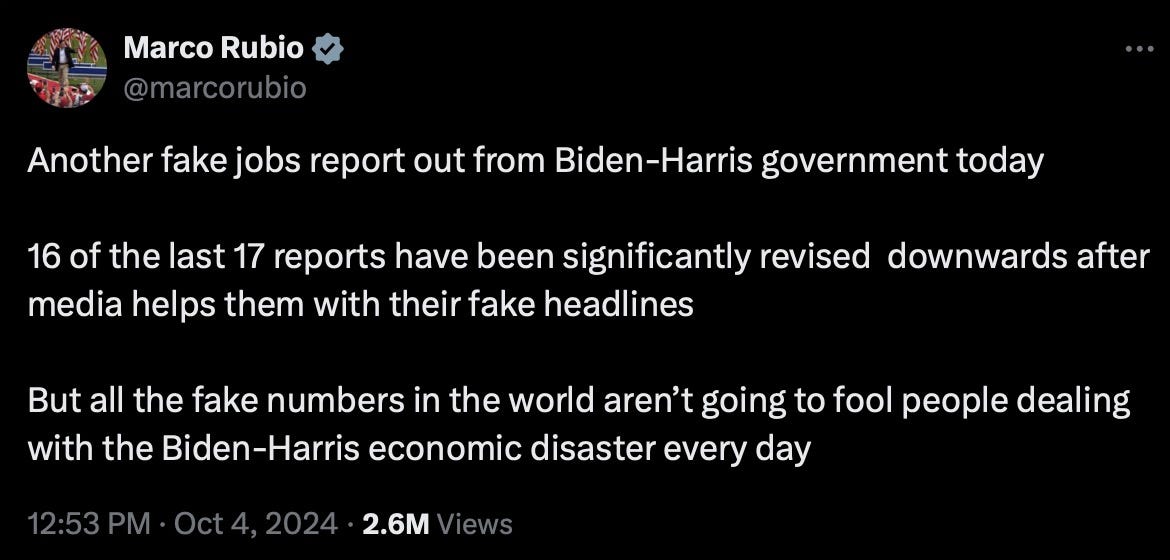Some bookkeeping at the top: We should note, for those of you who were confused yesterday, that we spoke in jest when we wrote that Bill is a “founding member” of the Daddy Gang from Alex Cooper’s Call Her Daddy podcast.
As everyone knows, Bill spends his entire podcast budget subscribing to Chapo Trap House. Happy Tuesday.

Did We Underestimate the Threat?
by William Kristol
Yesterday, in this newsletter, I discussed the significance of the fact that many of the new oligarchs have eagerly joined forces with populist demagogues in our rising authoritarian movement. Also yesterday, in a brilliant piece at The Bulwark, Hannah Yoest discussed the significance of Trumpists’ unabashed and unapologetic use of fake imagery, in the tradition of authoritarian and indeed fascist movements of the 20th century.
Yes, fascist movements. We in the anti-Trump camp have spoken a lot about the new authoritarianism. The question I want to raise today is whether authoritarianism captures the phenomenon we’re seeing. Or do we need to invoke the word fascism—or at least neo-fascism, or American-style fascism, or some other modification of that fraught and weighty tem?
Many of us have already noted similarities between Trumpism and aspects of fascism. In discussing Trumpism, we’ve found it useful to consider works by thinkers like Julien Benda (The Treason of the Intellectuals, 1927), Hannah Arendt (The Origins of Totalitarianism, 1951), and Umberto Eco (Ur-Fascism, 1995).
Such citations imply that there are real similarities—a real kinship—between what we’re seeing here and what earlier generations saw in 20th century Europe (and to some degree in the 20th century United States). But most of us haven’t quite said that what we’re seeing today really is a version of fascism. We see the cult of the leader and the strong man, the embrace of cruelty and bigotry, the demagoguery and the conspiracism, the weaponization of nostalgia for an imagined and exclusionary past, the eager embrace of lies and propaganda. But we’ve mostly stopped short of calling this fascism.
One who didn’t stop short was Robert Kagan, who wrote a piece, “This is how fascism comes to America,” way back in May 2016.
Kagan remarked then that Donald Trump, who had yet to win the nomination, had already “transcended the party that produced him.” And Kagan described what Trump stood for:
What he offers is an attitude, an aura of crude strength and machismo, a boasting disrespect for the niceties of the democratic culture that he claims, and his followers believe, has produced national weakness and incompetence. His incoherent and contradictory utterances have one thing in common: They provoke and play on feelings of resentment and disdain, intermingled with bits of fear, hatred and anger.
Kagan further explained that what Trump had tapped into “is what the founders most feared when they established the democratic republic: the popular passions unleashed, the ‘mobocracy.’” What we were seeing, Kagan said, was “the people in a democracy, excited, angry and unconstrained,” who “might run roughshod over even the institutions created to preserve their freedoms.”
And Kagan did not flinch from his conclusion: “This phenomenon has arisen in other democratic and quasi-democratic countries over the past century, and it has generally been called ‘fascism.’”
Kagan’s column—the whole thing—is worth re-reading in the context of what we have seen over the subsequent eight years, and with the more immediate knowledge of what we’ve experienced the past eight weeks.
What we need to consider now, I think, is whether some of us were mistaken to be less bold, less candid, than Kagan. We wanted to be polite to our fellow citizens, half of whom were willing to support Trump. Many of them are going along with things they shouldn’t have gone along with, in our judgment. But they surely weren’t fascists. They were our neighbors. They were decent people. They were merely misled.
But of course the phenomenon of decent people being misled also existed in 20th century Europe. And one has to add that as these movements swell, decent people can start to justify indecent things, sometimes even to revel in some of them.
To be clear: I’m not suggesting that we all now need to scream the word fascism from the rooftops. I’m not suggesting that politicians fighting Trumpism use terms like fascism or neo-fascism or fascism-American-style. They need to win voters over, not antagonize them. So Kamala Harris needs to make her case on abortion rights, and Ukraine, and economic growth, and the peaceful transfer of power. She does not need to dive into deep and treacherous waters of political philosophy.
But there is also a case for some of us not directly involved in electoral politics to strive for intellectual clarity. There is a case for coming to grips with what has happened, and what is happening. There is a case for overcoming some of our inhibitions against being impolite, and for seeing things as they are and calling them what they are.
It’s striking that following the assassination attempts against Trump, his campaign condemns those who dare use the word fascism, even suggesting that doing so is a (deliberate?) contribution to attempts to kill him. But one can oppose violence directed against politicians and their supporters while still speaking clearly of the character of the threat Trump poses, and while seeking to understand the threat for what it is.
The Bulwark is going on tour! We’ll be doing a three-city leg across the Blue Wall late next week, with shows in Philadelphia on Thursday, October 17; in Pittsburgh on Friday, October 18; and in Detroit on Saturday, October 19.
We know you’re really coming to see Sarah, Tim, JVL, and special guest George Conway, but your humble Morning Shots correspondents will be at the Philly show (and Andrew will be in Pittsburgh) as well. Tickets for that night’s show are on sale now. Hope to see you there!
This Is Your Brain on Space Lasers
by Andrew Egger
After being battered by Hurricane Helene just days ago, Florida’s gulf coast is staring down an even bigger threat this week: Hurricane Milton, a Category 5 storm currently bearing down on Tampa. Sen. Marco Rubio has a message for those in its path: Please get out while still you can.
“As of this morning all the models are converging on the same path,” Rubio tweeted Monday afternoon. “This storm is NOT going to turn away at the last minute. If you live in an evacuation zone the time to leave is as soon as you can. Do NOT wait for the last minute.”
A few years back, Rubio said he’d asked the National Hurricane Center what a worst-case storm hitting Florida would look like. “What they showed me back then is almost identical to the Milton forecast now.”
Messages like these are important. For a certain kind of person, official warnings from nonpartisan government agencies tend to fall on deaf ears. A political ally might have better luck reaching them.
But Rubio’s an imperfect messenger. And he has no one to blame for that but himself. The senator who is now imploring his constituents to trust the hurricane info they’re getting from the government has also told them not to trust that source in other areas of life.
Here was Rubio just last Friday, pretending that bog-standard revisions to federal unemployment numbers were actually part of a devious conspiracy to trick people into thinking the economy was doing well:
Other government functions Rubio insists nobody should trust include our criminal justice system—which, he wrote back in May, “Marxists and the far left” were using to inflict “sham show trials” on Donald Trump—and our system of elections. Rubio refused that same month to commit to accepting the results of the 2024 contest.
Storm predictions and jobs data are on different planes of severity. But the lines connecting the two are very clear. If you spend your time indulging conspiratorial thinking for political gain in every other area of life, it becomes harder to shoot straight with his constituents when the matters are of actual life and death.
It also allows for conspiratorial thinking to take root when things get serious.
While Rubio is busy imploring Floridians to trust the government and obey evacuation orders, a group of GOP lunatics is making another case entirely: that the government itself is responsible for whipping up the hurricane.
“Yes, they can control the weather,” Rep. Marjorie Taylor Greene tweeted last week. “It’s ridiculous for anyone to lie and say it can’t be done.” She later shared a list of patents supposedly filed for weather-control purposes and an old CBS clip of anchors discussing potential future tech for “lasers controlling the weather.”
“Climate change is the new Covid,” she concluded. “Ask your government if the weather is manipulated or controlled. Did you ever give permission for them to do it? Are you paying for it? Of course you are.”
What was the point of all this? To argue, in a just-asking-questions sort of way, that Hurricane Helene was primarily devastating red areas, which “could affect the election.”
Others were even more explicit. “The weather can and is being manipulated. Wake up,” former Georgia gubernatorial candidate and professional crank Kandiss Taylor wrote Sunday. “GA voting has been compromised and [I] don’t know if we will be able to get all our early voting days in. Now, a hurricane is coming straight for Florida. These two states are necessary for a Trump victory! No coincidence.”
A cacophony of anonymous MAGA accounts made the same case. “Not a single weather model predicted the storm would strengthen this quickly,” wrote “Donald J. Trump News,” an account with nearly a million followers on X. “Do you believe this storm is completely natural?”
Conspiracists and cranks have been around as long as humans have walked this earth. What’s different now is two elements. The first is that they increasingly occupy positions of power and have been given platforms to more widely spread their insanity. The second is that those who know better—the Marco Rubios of the world—have indulged their fantasies. They’ve embraced a little brain rot for the purposes of political gain and undoubtedly thought to themselves along the way: ‘Eh. What harm will be done?’ Hopefully, we don’t end up finding out. Sadly, we may.
Quick Hits
WHO’S POLITICIZING WHOM?: Even for critical functions like disaster response, working across the aisle these days can be politically fraught. NBC News reported yesterday that Florida Gov. Ron DeSantis was declining to take phone calls from Kamala Harris about storm recovery, citing a DeSantis aide that those calls “seemed political.”
In a Monday afternoon press conference, DeSantis denied the report, saying that “I didn’t know that she had called . . . they didn’t call me.”
Harris, however, went on the attack. “Playing political games at this moment . . . is just utterly irresponsible and it is selfish and it is about political gamesmanship,” she told reporters.
Later, DeSantis took to Sean Hannity’s Fox News show to clap back. “She’s the first one who is trying to politicize the storm. And she’s doing that just because of her campaign.”
It is genuinely confusing how we got to this place. Perhaps it was just a miscommunication among staffers. And yet, it remains depressing that, at each juncture, neither side looked up and said: You know what, I’ll take the high road this time.
WAIT, A NYT/SIENA POLL NOT CAUSING LIBERAL PANIC?: You can put away the Xanax. A new New York Times/Siena College poll found [checks notes] good numbers for Kamala Harris. She’s up 49-46 over Donald Trump among likely voters, with the paper noting that “Voters are now more likely to credit” her “with representing change and caring about people like them.”
The Times/Siena poll has tended to be a real bummer for Democrats. But this one is bound to give them a reprieve from their feeling of impending doom. As for whom is to credit for a brightening of Harris’s fortunes, the poll suggests that credit goes to Republicans. Nine percent of self-identified GOPers said they planned to support Harris, up slightly from five percent last month.
THE GHOST OF ANDY ROONEY DID NOT HAUNT HER: Kamala Harris sat down with 60 Minutes over the weekend for an interview that aired last night. And, if you watched it, you probably came away noting that it was, overall, pretty normal. A tough set of questions on immigration; a broadside attack on Trump for ducking the program; some insight into her view of the war in Ukraine. (You can read WaPo’s four takeaways here.) And that was that. Her campaign clearly was happy about it. They pushed around clips. Which invites the question: Why wasn’t she doing these sooner?







"Kamala Harris sat down with 60 Minutes over the weekend for an interview that aired last night. And, if you watched it, you probably came away noting that it was, overall, pretty normal. A tough set of questions on immigration; a broadside attack on Trump for ducking the program; some insight into her view of the war in Ukraine. (You can read WaPo’s four takeaways here.) And that was that. Her campaign clearly was happy about it. They pushed around clips. Which invites the question: Why wasn’t she doing these sooner?"
Show of hands: how many of you care about why she wasn't doing one-on-one interviews sooner? (checks audience) Seeing none, or nearly so, I conclude that this is a non-issue, simply the media playing the card for its own purposes. Far-right outlets like to talk it up purely to whip up the passions of their viewers and listeners. Center and left broadcasters sound too much like teenage girls, jealous that the homecoming king/football team quarterback flirted with some other girl instead of them.
If Harris had done more interviews instead of so many rallies, there is no guarantee that she would be in a better place now in the polls, and cynics likely would be saying, "Instead of holding all those interviews, she should be out on the campaign trail, meeting and talking to the voters more directly." It seems Harris' strategy so far has worked quite well. I trust in it. Maybe the talking heads should give her some earned benefit of the doubt as well.
"Why wasn’t she doing these sooner?"
Please stop.